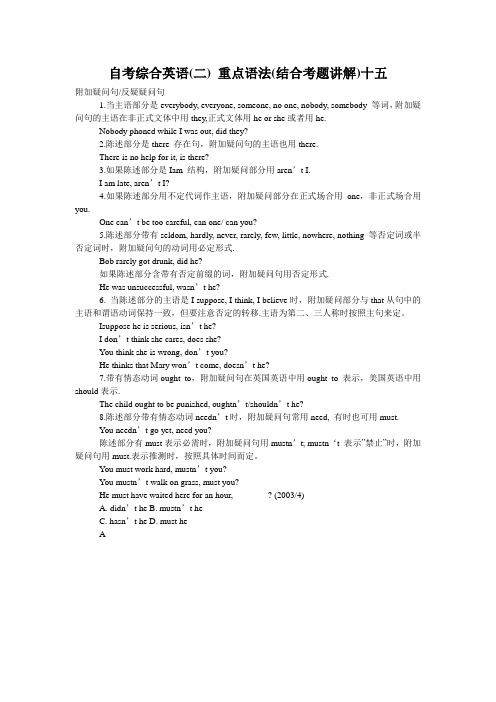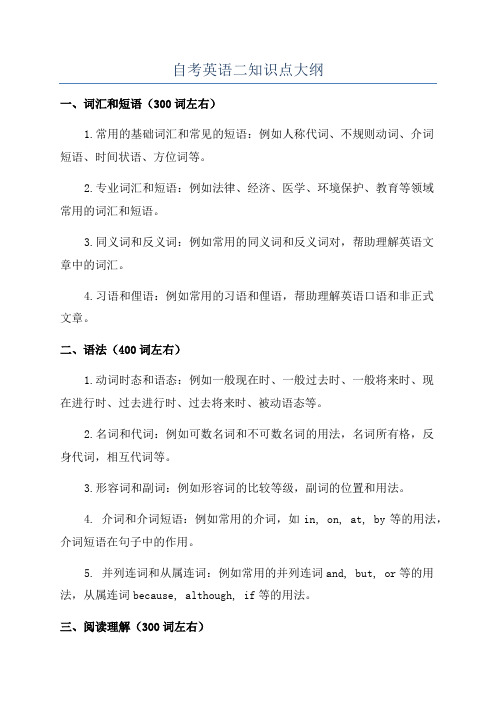自考英语二重点语法知识讲解
自考综合英语(二) 重点语法(结合考题讲解)六

自考综合英语(二) 重点语法(结合考题讲解)六语态主动形式表示被动含义:A. need/require/want/deserve doing= need/require/want/deserve to be doneB. smell /sound /taste /feel /prove +adj.The story proved quite false.The flowers smell sweet.C. Can’t, won’t…+vi. (move, lock, open,…)The door won’t shut.D. read, write, wash, clean, draw, burn, cook, wear…+adv. (well, easily….)下面请看几个例子:This kind of rice cooks more quickly.The cloth washes easily.His blue jeans have worn thin.还要注意一些主动形式表示被动含义的短语:Be to blame: be responsible fordon’t know who is to blame.sink in: be understoodcome out: be published重点短语:have/has sth. done (考试中出现的频率极高) 该短语有三个意思:(1)请/让某人做某事I will have my hair cut tomorrow.He has just had his bicycle repaired.(2)某物遭受到某一消极动作He had his finger burnt yesterday.He had his face cut when he was shaving his face.(3)主语本身做某事We’ll have all the dishes cleared away before seven p.m. every day.国考中主要考前两个意思。
自考综合英语(二) 重点语法(结合考题讲解)十五

自考综合英语(二) 重点语法(结合考题讲解)十五附加疑问句/反疑疑问句1.当主语部分是everybody, everyone, someone, no one, nobody, somebody 等词,附加疑问句的主语在非正式文体中用they,正式文体用he or she或者用he.Nobody phoned while I was out, did they?2.陈述部分是there 存在句,附加疑问句的主语也用there.There is no help for it, is there?3.如果陈述部分是Iam 结构,附加疑问部分用aren’t I.I am late, aren’t I?4.如果陈述部分用不定代词作主语,附加疑问部分在正式场合用one,非正式场合用you.One can’t be too careful, can one/ can you?5.陈述部分带有seldom, hardly, never, rarely, few, little, nowhere, nothing 等否定词或半否定词时,附加疑问句的动词用必定形式.Bob rarely got drunk, did he?如果陈述部分含带有否定前缀的词,附加疑问句用否定形式.He was unsuccessful, wasn’t he?6. 当陈述部分的主语是I suppose, I think, I believe时,附加疑问部分与that从句中的主语和谓语动词保持一致,但要注意否定的转移.主语为第二、三人称时按照主句来定。
Isuppose he is serious, isn’t he?I don’t think she cares, does she?You think she is wrong, don’t you?He thinks that Mary won’t come, doesn’t he?7.带有情态动词ought to,附加疑问句在英国英语中用ought to 表示,美国英语中用should表示.The child ought to be punished, oughtn’t/shouldn’t he?8.陈述部分带有情态动词needn’t时,附加疑问句常用need, 有时也可用must.You needn’t go yet, need you?陈述部分有must表示必需时,附加疑问句用mustn’t; mustn‘t 表示”禁止”时,附加疑问句用must.表示推测时,按照具体时间而定。
自考综合英语(二) 重点语法(结合考题讲解)十一

自考综合英语(二) 重点语法(结合考题讲解)十一时间状语从句表示“一……就……”的连词:once, as soon as, barely/hardly/scarcely…when, no sooner…than, the minute, the moment, the instant, immediately, directly, instantly 其他表示时间的短语还有:every time, next time, the day 等。
一些表时间的副词和短语也可引导状语从句.例:The day he returned home, his father was already dead.We shall have completed the work by the time he ________ back next week. (2003/4)A. will comeB. comesC. is comingD. will have comeBAs, when, while 虽然都表示时间,但是有区别的.As 多用于白话,强调”同一时间”或“一先一后”.例:1.As I was going out, it began to rain.(as强调两个动作紧接着发生)2. As spring warms the good earth, all flowers begin to bloom.(在这里是“伴随”的意思)When 强调特按时间例:1.When he was eating his breakfast, he heard the door bell rang.While 也表示同一时间,但表示的不是一点,而是一段,所以位于谓语动词必需为延续性动词形式.例:While he was eating his breakfast, his friend came to visit him.注意not…until… 正常结构、倒装结构、强调结构、和until置于句首的用法。
自考英语二知识点大纲

自考英语二知识点大纲一、词汇和短语(300词左右)1.常用的基础词汇和常见的短语:例如人称代词、不规则动词、介词短语、时间状语、方位词等。
2.专业词汇和短语:例如法律、经济、医学、环境保护、教育等领域常用的词汇和短语。
3.同义词和反义词:例如常用的同义词和反义词对,帮助理解英语文章中的词汇。
4.习语和俚语:例如常用的习语和俚语,帮助理解英语口语和非正式文章。
二、语法(400词左右)1.动词时态和语态:例如一般现在时、一般过去时、一般将来时、现在进行时、过去进行时、过去将来时、被动语态等。
2.名词和代词:例如可数名词和不可数名词的用法,名词所有格,反身代词,相互代词等。
3.形容词和副词:例如形容词的比较等级,副词的位置和用法。
4. 介词和介词短语:例如常用的介词,如in, on, at, by等的用法,介词短语在句子中的作用。
5. 并列连词和从属连词:例如常用的并列连词and, but, or等的用法,从属连词because, although, if等的用法。
三、阅读理解(300词左右)1.短文的主要内容:例如通过阅读文章,理解文章的中心思想和主题。
2.理解关键信息:例如通过阅读文章,理解重点信息或细节。
4.掌握上下文逻辑关系:例如通过阅读文章,理解上下文之间的逻辑关系,如因果关系,转折关系等。
四、写作(200词左右)1.书面表达:例如写一篇文章,描述一个地方、一个人、一个经历等。
2.书信写作:例如写一封信,邀请朋友参加活动、询问关于一些问题的信息等。
3.日记写作:例如写一篇日记,描述一天的活动、感受和思考。
4.故事写作:例如写一篇故事,包含起始、发展和结局。
五、听力(100词左右)。
自考00015英语二重点语法复习笔记

虚拟语气是把作者想陈述的动作当成一种只存在于讲话人想象中的“假设”或“推测”,而不是当作客观现象中真实事件。
它表达的是怀疑、忧虑、推测、假设、想象或祝愿等。
该语法现象应用在非真实条件中,包括虚拟条件句、推测条件句和错综复杂条件句。
这里所说的非真实条件句,大家便会联想到 if这个词,如果我们在句子中看到if引导的条件从句是以动词的过去式作为句子的主要谓语的话,我们就应基本设定它为虚拟语气。
如果句子中出现了wish 这个词,我们应该明白要考虚拟了。
Wish 如果在句子中表达的是与现在事实相反的结果,如果考系动词,一定要选择were;如果没有系动词,只是一个简单的动词,那么我们要选择它的过去式;第二,如果wish表达的是与过去事实相反的结果,那么我们就用had+过去分词(或 would/could+ have+过去分词);如果wish 表示的是将来没有把握或不太可能实现的愿望,用 would/should(could, might)+动词原形。
看几个例子:I wish she were here.对现在的虚拟,而且出现系动词了,用were.I wish she had taken my advice.从句意了解到,这个动作应该发生在过去,所以虚拟,应该用动词的过去完成式(当然里面可能会出现被动形式had been done ).I wish you would go with us tomorrow.表达的是将来没有有把握实现的愿望,用虚拟would+ to的形式。
实战一下:A: You have made some mistakes.B:I wish I____ mistakes every day.A. don?t makeB. haven?t c. wouldn?t have made D. didn?t makeevery day足以说明对现在的虚拟,应用动词的过去式,选D。
A: What would you wish to do if you were a college student again?B: That?s very hard to say, but I wish I____A. have not studied psychologyB. did study psychologyC. had studied psychologyD. studied psychology句子中出现了were , 说明是对过去的虚拟,应用过去完成式,选C。
00015英语二(自考)

00015英语二(自考)00015英语二重点语法(结合考题讲解)综合英语(二)常考的语法为:名词单数变复数,定语从句,虚拟语气,反意疑问句,非谓语动词,时态,名词性从句,形容词副词的比较级,主谓一致,倒装等等。
下面我们把这些语法项目进行详细的有重点的讲解。
名词1. 大多数集体名词可作单数,也可作复数,如:army ,audience ,class ,committee ,crew ( 全体船员,乘务员) ,crowd ,faculty ,family ,government ,group ,orchestra ,team ,union 等。
强调整体时谓语动词用单数,强调个体时谓语动词用复数。
如:The government is paying close attention to economic development.The government are having a heated discussion on this matter.2.有些名词形式为复数,却用作单数,如:electronics( 电子学) ,mathematics( 数学) ,optics( 光学) ,politics ,statistics( 统计学), economics (经济学), physics 等。
例如:Linguistics is a difficult subject to study.3. 名词作定语时,除了man和woman要和中心词一起变成复数之外,其它修饰词不能变成复数。
例如a woman teacher ---- two women teachersa man doctor ---- two men doctorsa girl student ---- five girl studentsa boy student ----six boy students4. 复合名词的复数只把其中所包含的主体名词变成复数。
自考综合英语(二) 重点语法(结合考题讲解)十七
自考综合英语(二) 重点语法(结合考题讲解)十七主谓一致1. many a, more than one +单数名词,谓语仍然用单数.Many a soldier has sacrificed his life for the revolution.2. either of +复数名词,谓语动词用单数.Has either of your parents visited you?3. and; both and 连接两个单数形式的名词词组,谓语动词用复数.当主语在意义上指同一人,同一物或同一概念时,谓语用单数.A boy and a girl want to go.A cart and horse is what he needs now.在英语中,有不少像a cart and horse这种表示单数概念的短语,如:a needle and thread a knife and forka watch and chain a cup and saucer即使这种表示单数概念的短语中有复数名词,谓语动词仍然用单数形式,如:Danish bacon and eggs makes a good solid English breakfast.More examples: bread and butter, trial and error, law and order, toast and marmalade, fish and chips4. each and each; every and every 等结构后,谓语用单数.Each man and (each) woman is asked to help.5.主语后面有as well as; together with; along with; rather than等词组,谓语的单复数有主语来决定.6. one of+复数名词+关系分句结构,如先行词为复数名词,谓语则为复数.当前面有the only/very等限定词修饰,谓语用单数.Joan is one of those people who go out of their way to be helpful.He is the only one of those boys who is willing to take on another assignment.7.靠近原则:由not only...but also, either...or, neither...nor 或or 连接的并列主语,通常按照就近一致原则,谓语动词的单复数形式由最接近它的名词词组的单复数形式决定。
自考英语二考点归纳总结
自考英语二考点归纳总结自考英语二是对学生英语能力的综合测试,涵盖了词汇、语法、阅读理解、写作等方面。
在备考过程中,对于各个考点的归纳总结是非常重要的。
本文将对自考英语二的主要考点进行梳理和总结,以便考生有针对性地进行复习和练习。
一、词汇考点1. 同义词辨析在自考英语二的词汇部分,同义词辨析是一个非常重要的考点。
常见的同义词辨析包括动词、形容词、副词等各种词性的同义词。
考生需要通过大量的练习,掌握这些同义词的用法和区别。
2. 动词短语自考英语二中,动词短语也是一个比较重要的考点。
常见的动词短语包括短语动词、动词+介词短语等。
在备考中,考生需要多积累和记忆这些常用的动词短语,以便在考试中准确运用。
3. 词义辨析词义辨析在自考英语二中占据了很大的比重。
考生需要对一些常见的词义进行辨析,例如不同词性的同一词汇的不同意思,以及一词多义的情况等。
只有通过大量的练习和积累,考生才能够在考试中准确选择正确的词义。
二、语法考点1. 时态和语态时态和语态在自考英语二的语法部分是重点考点。
考生需要熟练掌握各种时态和语态的形式、用法和变化规律。
只有通过反复的练习,考生才能够在考试中准确完成相关的语法题目。
2. 从句和连接词从句和连接词也是一个重要的考点。
考生需要掌握主从复合句的构成和用法,同时了解各种连接词的作用和区别。
通过大量的语法练习,考生可以提高对于从句和连接词的理解和应用能力。
3. 介词和冠词介词和冠词是自考英语二语法部分中的基础考点。
考生需要认真学习和掌握各种介词和冠词的用法,特别是一些容易混淆的介词和冠词。
只有通过大量的练习和积累,考生才能够熟练运用这些介词和冠词。
三、阅读理解考点1. 主旨大意题主旨大意题是自考英语二阅读理解部分的重点考点。
在解答这类题目时,考生需要通过细读文章,抓住文章的中心思想,并对选项进行辨析。
通过训练和实践,考生可以提高在主旨大意题上的解题能力。
2. 细节题细节题也是自考英语二阅读理解部分的考点之一。
自考综合英语(二) 重点语法(结合考题讲解)十
自考综合英语(二) 重点语法(结合考题讲解)十as/which引导定语从句的区别(1)位置不同:as可置于句首,也可置于句中,而which只能放在句中。
(2)指代不同。
as引导定语从句时,其先行词为整个主句。
which引导非限制性定语从句,其先行词也可以是主句或主句中的一部分。
(3)与主动动作先后不同:as从句表示的行为经常是在主句行为之前,而which引导的定语从句表示的却在主句之后,表示连续发生的事情或结果等。
As was expected, the England team won the football match.He promised to help me, which he did.He was often late for work, which cost him his job.注意先行词为时间、地点或原因时,关系词的选用如果用when, where 或why,关系词在从句中应该是做状语,不然的话则应该用which / that等。
例如:I will never forget the days ________ I spent with my friends in the country.that/which/ \exercises1. The boy was paid $10 for washing ten windows, most of ____ hadn’t been cleaned for at least a year. (2005/10)A.thoseB.theseC.thatD.Which2. Anyone ______ has something interesting to concentrate on won’t find life boring. (2005/4)A. whoeverB. whomeverC. whoD. whichD C3. Athletes ______ at the Olympic Games are supposed to be nonprofessionals. (2004/10)A. who competeB. who are competingC. who will competeD. who have competed4. Television, ______ came into being in 1939, did not become common until the early 1950s. (2004/4)A. thatB. whatC. whichD. itA CAdverbial Clauses用作状语的从句叫状语从句(adverbial clause).。
自考综合英语(二) 重点语法(结合考题讲解)十四
自考综合英语(二) 重点语法(结合考题讲解)十四3. 表语从句表语从句对主语的内容起解释和阐述的作用;若表语从句用that 引起,that 起连接作用,不能省略。
表语从句也可用连接词how, when, where, why, what 引起。
由because 引起的表语从句通常只用在“this/that/it is because…” 结构中。
与此形成对比的是:The reason (why) …is that…4. 同位语从句的常用的引导词that在从句中不做成份,但不能省略。
有时也可由whether, how, why, where, when 等来引导。
例如:We have got the news that our team won the football match.Word came that he was needed at home. The question whether or not I should help him in such a case troubled me greatly.注意区分定语从句和同位语从句。
The idea that girls are not as clever as boys is harmful.(同位语从句)The idea that struck him startled his parents.(定语从句)在名词性从句中“疑问词ever”不能换成”no matter+疑问词”,视情况可以换成“anyone /anybody who”或”anything that”, 在状语从句中可以换用.Exercises1. We give a helping hand to ______ needs our help.A. no matter whoB. whoeverC. whomeverD. no matter whom2. _______ wants to come to our class is welcome.A. anybody whoB. whoeverC. whomeverD. both A and BB D3. _______ you go, I will go with you.A. no matter whereB. whereverC. any place whereD. both A and B4. If you like it, _______ it is, I will buy it for you.A. whatB. whateverC. no matter whatD. both B and CD D。
- 1、下载文档前请自行甄别文档内容的完整性,平台不提供额外的编辑、内容补充、找答案等附加服务。
- 2、"仅部分预览"的文档,不可在线预览部分如存在完整性等问题,可反馈申请退款(可完整预览的文档不适用该条件!)。
- 3、如文档侵犯您的权益,请联系客服反馈,我们会尽快为您处理(人工客服工作时间:9:00-18:30)。
重点语法知识讲解1.动词的时态和语态动词的时态和语态一览表时态语态一般现在时一般过去时一般将来时主动被动 do are done did were done will do will be done现在进行时过去进行时将来进行时主动被动 are doing are being done were doing were being done will be doing 现在完成时过去完成时将来完成时主动被动 have done have been done had done had been done will have done will have been done现在完成进行时主动被动 have been doing1.1 现在完成时发生在过去的动作一直持续到现在,或对现在仍有影响。
现在完成时的标志: so far, by now/ up to now,for three years, since 1995,in the past two decades1.2 过去完成时过去的过去。
1)said, reported, thought 等引导的间接引语中。
He missed the train.He said he had missed the train.2)hardly…when, no sooner… than句型中表示先发生的动作No sooner had he got up than he received the call.3)与过去事实相反的虚拟语气中If I had tried harder, I would have won.I wish I had done better in the exam.1.3 完成进行时从过去一直持续到现在,没有间断。
汉语提示语:一直The water has been running the whole night.1.4 过去时过去某一具体时间发生的事,不考虑与现在的关系。
过去时的标志:yesterday, in 1995, last week,in the nineteenth century,five years ago 等等。
2.非谓语动词2.1 非谓语动词一览表非谓语动词形式意义现在分词一般式 doing 主动 , 正在进行被动式 being done 被动 , 正在进行完成主动式 having done 主动 , 已经完成完成被动式 having been done 被动 , 已经完成过去分词 done 被动 , 已经完成动词不定式一般式 to do 主动 , 将要进行被动式 to be done 被动 , 将要进行完成主动式 to have done 主动 , 已经完成进行主动式 to be doing 主动 , 正在进行2.2. 非谓语动词作状语动词不定式:1)目的状语;2)结果状语I came here to meet you. (目的)He hurried to the rail station only to miss the train. (结果)分词:1) 伴随状语;2)原因状语;3)条件状语 4)让步状语;5)时间状语Walking along the street, he met his old friend. (时间)Being very tired, my father didn’t go out with us. (原因)Made by hand, the silk shirt is very expensive. (原因)Seen from the space, the earth looks like a blue ball. (条件)2.3 非谓语动词,状语从句和独立结构1) Having done their homework, the children began to play. (分词作状语)2) After having done their homework, the children began to play. (连词+分词)3) After they had done their homework, the children began to play. (状语从句)4) With homework done, the children began to play. (独立结构)2.4 非谓语动词作定语1) If there is no choice, there is no decision ___ (make). (to be made)2) Do you know the man ____ ( stand) in front of the house? (standing)3) The question ____ (discuss) at the moment is very important. (being discussed)4) The bridge ____ (build) in the 1950s is still in good condition. (built)2.5 动名词和动词不定式作主语和表语动名词作主语/表语表示一般、抽象的情况;动词不定时作主语表示具体某次的情况。
Rising early is good for health.To rise early tomorrow is difficult for me.It is difficult for me to rise early tomorrow.My biggest wish is to go abroad.Seeing is believing.作宾语接动名词作宾语的动词:admit, acknowledge, avoid, appreciate, consider, delay, enjoy, escape, excuse, forgive, finish, include, involve, mind, put off, postpone, suggest, feel like, look forward to, be used to, be accustomed to, etc.接动词不定式作宾语的动词:want, tend, intend, pretend, hope, plan, expect, be supposed to, seem, be likely to, used to, be willing to, desire, force, prefer, start, begin接动名词和动词不定式有不同含义的动词:1) forget, remember, regret2) stop, continue3) need/ want4) allow doing/ allow sb to do(1) How can I forget meeting you for the first time?Sorry, I forgot to lock the door.(2) I can’t stop laughing. Can you stop to give me a hand?(3) The grass needs cutting. The grass needs to be cut.(4) We don’t allow smoking here. You are not allowed to smoke here. 3.虚拟语气第一大类:非真实条件下的虚拟语气时间从句主句与过去事实相反 had done should/could/would + have done与将来事实相反 were to do should do should/could/would + doIf I were you, I would be happy to do it.If we had got the news, we could have prepared earlier.If the job were to succeed, you should work harder.第二大类:从句中用过去时或过去完成时的虚拟语?/1) would rather + 从句2) wish + 从句3) if only + 从句4) as if/ as though + 从句5) It’s time + 从句I would rather you didn’t tell me the story now.I would rather you had told me the story yesterday.第三大类:从句中用should加动词原形的虚拟语气,其中should可省略。
1) suggest, propose, advise, move(动议), ask, order, require, request, desire, insist, prefer 等动词后接的宾语从句;2) suggestion, proposal, advice, motion, order, requirement, request, desire, preference等名词后的同位语从句;3) important, necessary, essential, imperative, desirable, advisable, preferable 等形容词用在it is … that…句型中;4) lest, in case, for fear that 等引导的从句中。
It is suggested that the meeting (should) be put off.It is my suggestion that the meeting (should) be put off.It is necessary that the meeting (should) be put off.4.定语从句和名词性从句4.1 定语从句:限制性和非限制性定语从句引导定语从句1)关系代词(在定语从句中作主语、宾语、表语):which, that, who, whom, whose2)关系副词(在定语从句中作状语):when, where, why, how名词性从句:主语从句、宾语从句、表语从句、同位语从句引导名词性从句:1)主从连词(不在从句中作任何成分):that, whether, if2)连接代词(在从句中作主语、宾语、表语):what, which, who, whom, whose, whatever, whoever…3)连接副词(在从句中作状语):when, where, why, how4.2 定语从句和同位语从句的区别定语从句对名词进行修饰限制,而同位语从句阐述的是名词的具体内容。
